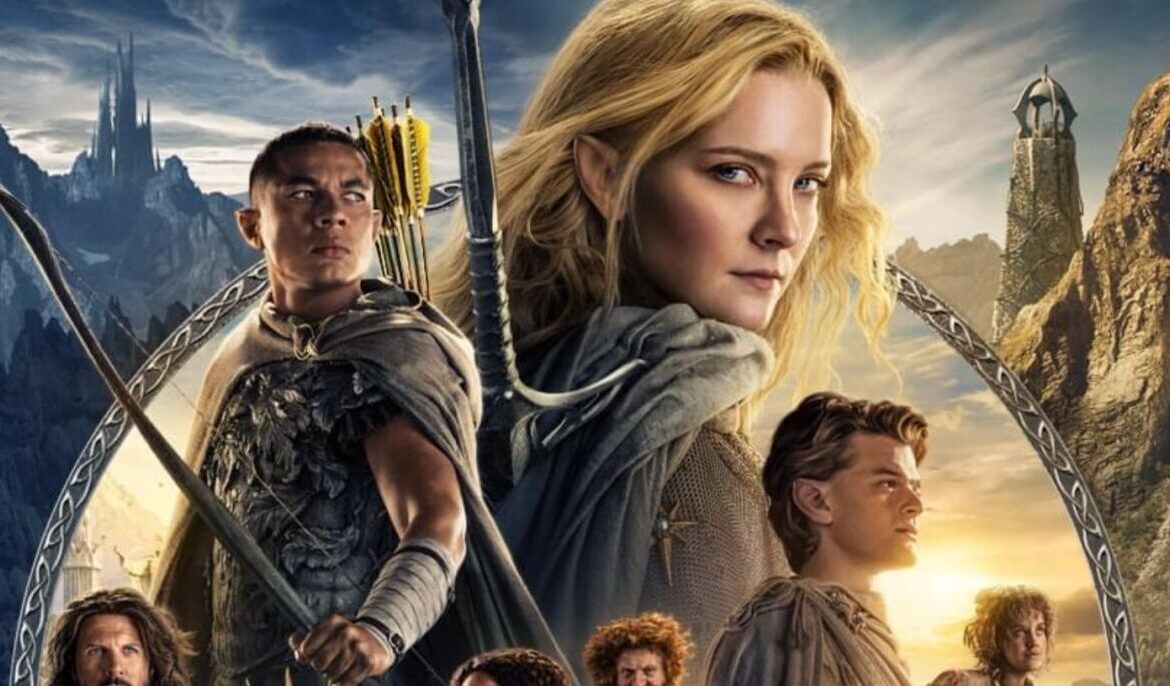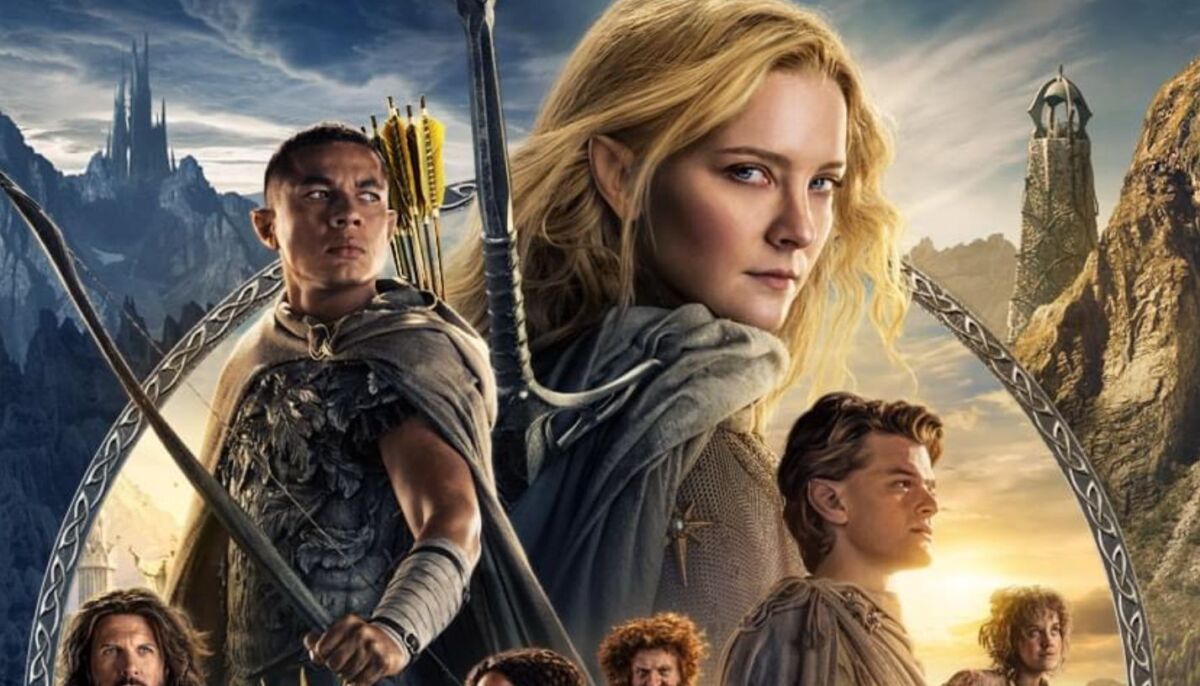Is there a show in recent memory with more riding on it than The Lord of the Rings: The Rings of Power? Everything about the Prime Video series – from its billion-dollar budget to its ethnically diverse cast – has come under intense fan scrutiny since Amazon paid an eye-watering amount for the rights to J.R.R. Tolkien’s fantasy trilogy back in 2017. All this attention boiled down to one question: will this new adaptation do the books justice? With Season 1 officially done and dusted, the answer to that question turns out to be both ‘yes’ and ‘no’. The Rings of Power is a good show, but not quite a great one – not yet anyway.
That’s not for want of trying, though. Showrunners J. D. Payne and Patrick McKay stick closely to Tolkien canon (to a fault, at times), drawing largely from The Lord of the Rings’ appendices to craft a story set thousands of years before the books’ main narrative. Season 1 opens on Middle-earth during peacetime, although Elven warrior Galadriel (Morfydd Clark) is among those convinced that Sauron isn’t really gone for good (we know this too, which means we’re in from the jump). Her quest to hunt down the absentee dark lord is one of several interconnected plot threads that unfold over the Rings of Power’s sprawling narrative, which takes us from the shining island kingdom of Númenor to the depths of Khazad-dûm’s mines.
Along the way, we’re introduced to a colorful cast of new characters, including dwarven prince Durin IV (Owain Arthur), Hobbit-like Harfoot Nori (Markella Kavenagh), and roguish human Halbrand (Charlie Vickers). We’re also reacquainted with several figures previously portrayed by different actors in Peter Jackson’s Oscar-winning Lord of the Rings films, such as Elrond (Robert Aramayo), Elendil (Lloyd Owen), and Isildur (Maxim Baldry). They’re a mostly likeable bunch and tailormade to take us on an epic journey in the grand Tolkien tradition.
And the tale The Rings of Power tells is epic, not to mention largely in keeping with what Middle-earth fans would expect – which is actually one of the show’s biggest problems, at least early on. Payne and McKay, along with the show’s directors and writing staff, initially struggle to balance their duty to respect Tolkien’s established canon with their obligation to tell a story that stands tall on its own merits. The result is that the first couple of episodes in Season 1 feel overly familiar, with tired Tolkien tropes – think doomed interspecies relationships, supernaturally-alluring McGuffins, and folksy little people – dominating proceedings.
This, along with occasional pacing issues – like when Galadriel and Halbrand are lost at sea for what feels like forever – ensures that The Rings of Power gets off to a rocky start. Fortunately, Payne, McKay, and their team soon begin playing around with Middle-earth lore in interesting ways that distinguish the show from both the source material and its beloved big screen adaptations.
Sure, purists will grit their teeth at some of the alterations to Tolkien’s legendarium in The Rings of Power, and admittedly, not all of Payne and McKay’s changes work. Heck, some of them don’t even feel like they belong in the same world, especially the un-Tolkienian subplots involving magic swords and Daniel Weyman’s mysterious stranger. Yet even the most misjudged tweaks to Middle-earth canon in the show still serve an important purpose: to make Lord of the Rings work as a long-form sequential narrative. Streamlined fantasy sagas devoid of any real mystery elements work great on the page and on film, but across an eight-episode season of TV? Not so much.
And in fairness to Payne and McKay, they rarely contradict Tolkien’s writings outright. Instead, they tend to embellish on what’s already laid out by the author, filling in any gaps with new characters and events, and just generally trying to put a fresh slant on The Lord of the Rings. Previously unexplored concepts like Orc rights and social inequality in Middle-earth are thrown into the mix, alongside themes close to Tolkien’s own heart, such as cross-culture fellowship and holding out hope against all odds. To the showrunners’ credit, these more contemporary concerns blend in well with everything else around them for the most part, even if the way they’re expressed leaves a lot to be desired thanks to The Rings of Power’s clunky dialogue
Every time someone spouts a cringeworthy phrase like “The sea is always right” it distances The Rings of Power from Tolkien’s works (and Jackson’s movies) – and not in a good way. It also makes the actors’ jobs that much harder, too. Even so, several of The Rings of Power’s cast members still shine almost as bright as the Mithril unearthed halfway through the season. Clark is a particular standout, nailing the Elves’ signature breathy delivery and bringing emotional depth to a role that could’ve easily wound up two-dimensional at best.
Her co-star Joseph Mawle is equally impressive as Adar, a new antagonist created especially for the show. Mawle turns in an understated performance not typically associated with the villains of Middle-earth, eschewing their one-note megalomania in favor of controlled, righteous fury. In this, he benefits greatly from Payne and McKay’s willingness to embrace a degree of moral ambiguity absent from most of Tolkien’s writings (outside maybe The Silmarillion). The upshot is that Adar is a baddie with disarmingly sympathetic motivation and he’s arguably the most compelling thing about the show, period.
But then, The Rings of Power: Season 1 draws to a close just as it’s really starting to hit its stride – with a few more episodes, other elements might’ve reached the same heights as Adar’s characterization. Indeed, several key developments late in the game feel slightly rushed, resulting in plot points and character arcs paying off in an underwhelming fashion. It’s debatable how much the average viewer will care, though, as the show remains a feast for the senses even when its storytelling quality dips. All that money Amazon spent is very much visible on the screen, and the production values are so spectacular, they largely make up for The Rings of Power’s shortcomings elsewhere.
The Jackson trilogy’s aesthetic obviously influenced Payne, McKay, and their crew, which is hardly surprising given the enduring popularity of those films. The Rings of Power more or less succeeds at replicating the same look and feel, even including a few novel flourishes of their own. The show’s CGI is equally breathtaking, delivering sweeping vistas and explosive set pieces on par with a blockbuster movie. Toss in a main theme by The Lord of the Rings composer Howard Shore and a complementary score by Bear McCreary and you’ll feel like you’re back in Middle-earth from the very first frame.
That’s not to say that the seams of Payne and McKay’s worldbuilding don’t occasionally show, though. There are moments scattered throughout Season 1 that make it clear that even The Rings of Power’s budget does, in fact, have limits – whether it’s through unconvincing visual effects (notably, the cut-and-paste extras) or uninspiringly staged and shot action scenes (Episode 6’s big battle feels small). This doesn’t happen often and it’s never noticeable enough to derail the whole show entirely, but it’s yet another thing that keeps The Rings of Power from being the definitive Lord of the Rings adaptation.
But hey, we’re only one season down, with another four supposedly on the way. That’s plenty of time for Payne and McKay to iron out the show’s few rough edges. And if The Rings of Power continues on its current upward trajectory, who knows? By the time we reach Season 5, perhaps the hype surrounding the show will finally ring true.
Review screeners provided
Some of the coverage you find on Cultured Vultures contains affiliate links, which provide us with small commissions based on purchases made from visiting our site.


